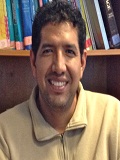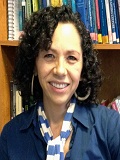|
|

Mario López-Gopar |

William Sughrua |

Angeles Clemente |
¡Bienvenidos! to the first 2012 newsletter
from the Bilingual Education Interest Section (BEIS). We are honored to
have served as the editors of this nonthemed issue. Working with the
authors of the articles presented here and with Kristin Snoddon, current
chair of BEIS, has been an enriching dialogical experience. We have
learned so much from them and their educational realities. And so will
you, we are sure.
The articles included in this newsletter illustrate the
different, yet common, realities of the main agents in the educational
sphere: teachers and students. The article by Illescas-Glascock sheds
light on the struggles faced by new teachers submersed in the
educational seas without a life jacket. Illescas-Glascock shows how
teachers, like herself, have navigated the system in search of their own
identities as educators. Similarly, the article by Abraham addresses
how an English-speaking teacher who could be considered deficient in
Spanish uses her own bilingual emergence as a way to support her
students’ bilingual and biliteracy development; this results in both the
teacher’s and the students’ identities moving from that of deficient
language learners to creative bilinguals. In her article, Stille
demonstrates how researchers, as active teachers, are able to engage
children and parents in projects that tap into diverse types of
expertise often not recognized as legitimate in the classroom. By
creating a school garden project, students and teachers roll up their
sleeves in order to discover new ways of developing language and
multiliteracies.
Following BEIS’ advocacy position with respect to bilingualism
and multilingualism, Ng’s article provides a critical perspective on
heritage language programs in Canada, which could easily be applicable
to other countries. There is still a lot to be done in order to promote
other minoritized languages besides English. Hence, we are pleased to
include in this issue the article by Probst Lucena, which is written in
Portuguese. This article, following from the pioneering and widely
influential work of Paulo Freire, puts critical pedagogy into practice
to develop socioculturally responsive language practices.
Even though much remains to be done in order to fulfill the
BEIS purpose, these articles demonstrate that it is possible. We feel
certain that there are thousands of teachers out there who promote
multilingualism, value their students’ literacy and multilingual
practices, and tap into the rich knowledge that students bring to the
classroom. Hopefully, many teachers/researchers will come forward in
future issues of the newsletter, so we can learn from them and continue
to be inspired by their work.
Please note the call for papers for the themed newsletters
edited by Francisco Ramos and Yvette Lapayese. Submissions can still be
sent to framos@lmu.edu.
In addition, take a look at the BEIS sessions scheduled for the TESOL
conference in Philadelphia this year. We hope to see you
there!
Mario López-Gopar, William Sughrua, and Angeles Clemente
are professors at the Faculty of Languages of Universidad Autónoma
Benito Juárez de Oaxaca. Mario holds a doctorate in second language
education from the Ontario Institute for Studies in Education at the
University of Toronto. His PhD thesis was awarded both the 2009 AERA
Second Language Research Dissertation Award and the 2009 OISE
Outstanding Thesis of the Year Award. His main research interest is
intercultural and multilingual education of Indigenous peoples in
Mexico.
William Sughrua is in the final stage of
completing a PhD in applied linguistics from Canterbury Christ Church
University in the United Kingdom.His
research interests are in critical applied linguistics, reflexive
ethnography, and alternative academic writing.
Angeles Clemente is chair of the Critical Applied Linguistics
Research Group. She holds a PhD in applied linguistics from the
University of London, where she was a research fellow during 2000-2001.
She is a member of the Mexican Researchers’ System and carries out
research in the area of sociolinguistics in the context of
Mexico. | 
